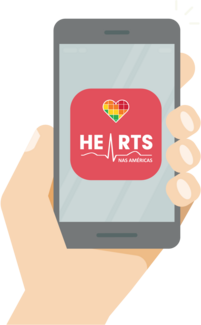
As part of the activities to mark World Heart Day, the Pan American Health Organization invites you to participate in a new HEARTS in the Americas webinar, titled "2021 WHO Guideline for the pharmacological treatment of hypertension: Let's implement it now!", that will take place on Friday, 1 October 2021.
Background
More people die each year from cardiovascular diseases (CVD) than from any other cause. Hypertension is the leading risk factor for CVD and a severe medical condition that significantly increases the risk of heart, brain, kidney, and other diseases. Prevalence of hypertension is high in the Americas; although it is relatively easy to diagnose and its treatment is very cost-effective, there are significant care gaps. Indeed, in 2019, despite some progress in the last decade, in Latin America and the Caribbean, 28% of women and 43% of men were unaware of their condition. Moreover, million were not receiving their needed treatment. Among those treated, 29% of women and 24% of men were not controlled. Consequently, only 35% of women and 23% of men had hypertension controlled among that population.
The WHO Guideline for the pharmacological treatment of hypertension in adults, recently released, provides new recommendations to help countries improve the management of hypertension. The recommendations cover the blood pressure level to start medication, what type of medicine or combination of medicines to use, the target blood pressure level, and how often to have follow-up checks on blood pressure. In addition, the guideline provides the basis for how physicians and other health workers can contribute to improving hypertension detection and management. This new guideline is relevant to update and catalyze the implementation of HEARTS in the Americas.
By 2025, the HEARTS will be the model for cardiovascular disease risk management, including hypertension, diabetes, and dyslipidemia in primary health care in the Americas. HEARTS in the Americas will be the front-line program to strengthen, integrate, and improve the quality of care for NCD in primary health care in the post-COVID 19 recovery. The Initiative is currently being implemented in 16 countries, with 739 primary health care centers participating within an aggregate catchment area of over 8 million people.
Audience
- Primary Health Care Providers from all institutions, including centers implementing HEARTS.
- Professional Societies of Cardiology, Hypertension, Family Medicine, and others.
- Ministry of Health personnel including the areas of Primary Care, Noncommunicable Diseases, Health Technologies.
How to participate
- DATE: Friday, 1 October 2021
- TIME: 2:00 - 4:00 pm (EDT) [check below the time correspondence]
- REGISTER: https://paho-org.zoom.us/webinar/register/WN_T4aYm0UxTMOqCqMoltu_1A
- After registering, you will receive a confirmation email with information on how to join the webinar.
- If the capacity of the virtual room is exceeded, you can follow the session on the PAHO YouTube channel in the following link https://www.youtube.com/watch?v=yWMIyhvjehc
- LANGUAGE: The session will be in English, Spanish and Portuguese with simultaneous translation, as well as close caption..
Recording
Agenda
Moderador: Dr. Pedro Ordúñez, MD PhD – Regional advisor on Cardiovascular Diseases, HEARTS in the Americas program (PAHO)
First Section. WHO Hypertension Guideline. Process and Recommendations
- Method for developing the guideline. Dr. Vilma Irazola MD PhD. Director. Chronic Disease Research Department. Institute of Clinical and Health Effectiveness. University of Buenos Aires
- Guideline Recommendations and Implementation Remarks Donald DiPette. MD. Health Sciences Distinguished Professor. University of South Carolina School of Medicine.
Q and A
Second Section. Special settings and Implementation tools
- COVID-19 and Hypertension. Dr. Kenneth Connell. MD, PhD. Deputy Dean. Faculty of Medical Sciences. The University of the West Indies Cave Hill Campus.
- Algorithmic approach. Andrew Moran. MD MPH. Director, Global Hypertension Control Program. Resolve to Save Lives
Q and A
Third Section. Policy considerations
- Support and Commitment from Professional Societies
- Interamerican Society of Cardiology. Alvaro Sosa Liprandi. MD. Presidente
- Latin American Society of Nephrology and Hypertension. Alejandro Ferreiro. MD. Presidente
- World Stroke Organization. Sheila Martins. MD President-Elect
- Key messages for policymakers and stakeholders. Norm R.C. Campbell. MD PhD. Professor Emeritus of Medicine. University of Calgary. Canada
Time Correspondence
- 12:00 pm. – Belmopan, Guatemala City, Managua, San José (CR), San Salvador, Tegucigalpa
- 1:00 pm. – Bogotá, Kingston, Mexico City, Panamá City
- 2:00 pm. – Bridgetown, Castries, Georgetown, Nassau, Port-au-Prince, Port of Spain, San Juan, Washington DC
- 3:00 pm. – Brasilia, Paramaribo, Santiago
- 8:00 pm. – Ginebra, Madrid
For other cities, check the time in the following link
Related links:
Articles
- Guideline for the pharmacological treatment of hypertension in adults. Geneva: World Health Organization-2021. https://www.who.int/publications/i/item/9789240033986
- Campbell NRC, Ordunez P, Giraldo G, Rodriguez Morales YA, Lombardi C, Khan T, Padwal R, Tsuyuki RT, Varghese C. WHO HEARTS: A Global Program to Reduce Cardiovascular Disease Burden: Experience Implementing in the Americas and Opportunities in Canada. Can J Cardiol. 2021 May;37(5):744-755. https://pubmed.ncbi.nlm.nih.gov/33310142/



